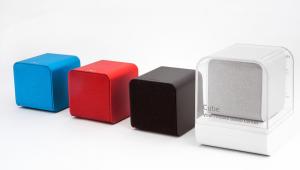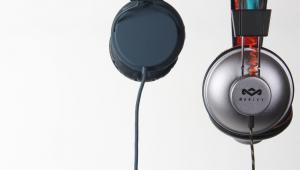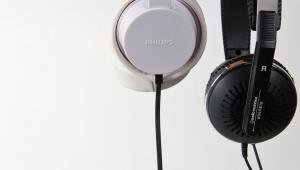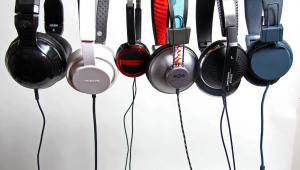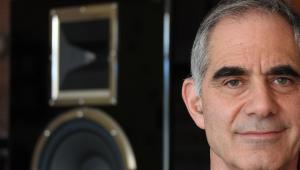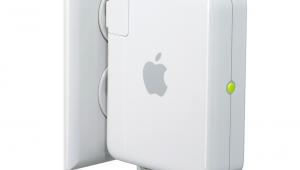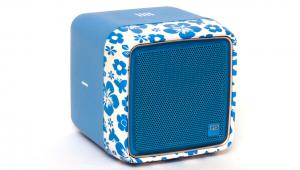NERVANA Headphones: "I'm gonna get you high today, 'cause it's Friday."
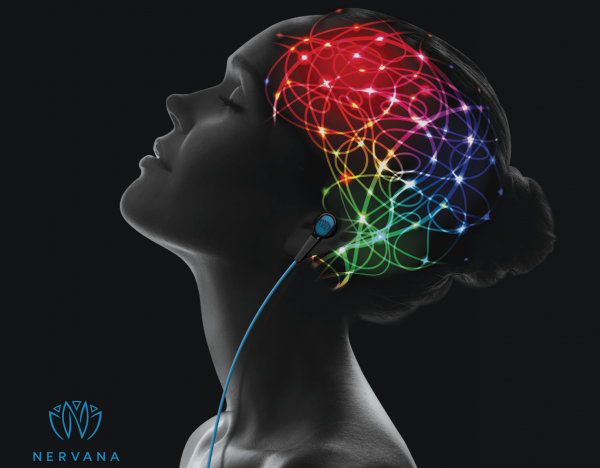
After CES, about a dozen people forwarded me some version of this story concerning a pair of headphones that claim to make you feel psychologically and physically better just by listening to them. Okay, technically, most of the articles stated the headphones “get you high,” but that’s more or less the same concept. Needless to say, I was initially convinced that Lirpa Labs was somehow involved.
But sure enough, the press kit from the company in question, Nervana, clearly stated that their headphone system “delivers proprietary electrical signals through the skin to stimulate the Vagus nerve and synchronizes with music to provide a positively altered state of mind.”
“Nervana signals electrically stimulate nerves that trigger pleasure producing neurotransmitters such as dopamine, serotonin, and oxytocin. Neuroscientists have known for decades that these compounds are responsible for sensations of happiness, infatuation, and enhanced mood.”
Wait. Really? I needed to know more.
Turns out, Nervana is a start up out of Florida that is comprised of: a cardiothoracic surgeon who makes medical devices, an MD who is double-board certified in pain management treatment, a CEO with degrees in nursing and psychology, an electrical engineer, and a mechanical engineer who previously worked in nanotech. Seeing these kinds of credentials behind a product certainly make one take a company’s claims more seriously.
Nervana is a system that includes a playback and control device as well as yes, headphones. Here’s how the creators say the system works: “Nervana directs a proprietary low voltage electrical signal to the Vagus nerve which, when stimulated, increases the release of neurotransmitters in the brain that improve mood. Nervana synchronizes the signal with any music selected by a user, which means that the stimulation signal will be unique to each different song played.”
At first blush, that sounds plausible, and really cool. I’ve actually heard of Vagus nerve stimulation as a pain-reduction technique for those who are unable or uncomfortable taking pain medications. While I’ve never read about Vagus nerve stimulation causing a euphoric state, the concept doesn’t sound far fetched. I mean, I’m not a doctor, and a lot of the people behind Nervana are. Could this actually work?
Of course, I requested a review sample. Sadly, Nervana is still in the early stages, and don’t as of yet have samples to send out to press. In fact, the company is in its infancy: Nervana will only become available for pre-order on crowd-funding site Indiegogo beginning on March 15th. Before I start entering my credit card info, I have some serious questions. Most notably, do they really work?
Since there are so many MDs behind Nervana, I figured there would be scientific backing behind the claims. Nervana’s press representative informed me that as of yet there are no clinical trials or studies that I could refer to showing Nervana’s efficacy. Hmm. It was time to get a second opinion.
Fortunately, I happen to be friends with a brain surgeon. Since there isn't any research to reference he wasn’t able to make a definitive statement without seeing the product. But off the record, he was able to give me his (super expensively) educated opinion. Here’s the email I got back:
“I know nothing about these headphones but it sounds like a load of baloney to me.The vagus nerve is not near the ear canal so I'm not sure why they'd think an earbud could do anything to the vagus nerve. Vagal stimulation IS used for some forms of treatment resistant depression and for some forms of epilepsy, but those are implanted electrodes that are in contact with the nerve.”
My credit card is now firmly back in my wallet. But here’s the thing: a handful of tech writers from Futurism tried Nervana out and said they had really positive results. What gives? Is it possible that this supergroup of collaborators behind Nervana (which, I suddenly began to notice don’t include any brain specialists) discovered something that a neurosurgeon who specializes in clinical research hasn’t heard of? Or, is it that, more likely, Nervana is trading in the placebo effect?
Nervana is careful to not make any medical claims, although they do caution against use while operating heavy machinery, driving, pregnant, or breastfeeding. Why breastfeeding? Will my baby will get a contact high?
What they don’t discuss are the topics that popped into my head: I’d be concerned if someone struggling with depression/anxiety/PTSD decided to use Nervana instead of seeking qualified medical assistance. Or someone already taking SSRIs sought to wean off of their medication and instead enhance their mood with Nervana. Also, pregnant women can’t use Nervana, but what about people with pacemakers?
When you’re straddling the line between health and recreational product, a lot of issues with usage can crop up. With so many doctors tying their name to Nervana, and so many sciency terms being thrown around, it becomes understandable that consumers could become confused about what Nervana really can do. My hope is that Nervana will do the right thing and include disclaimers as well as links to resources for those who need mental health support as part of their final website and packing materials.
Here’s the bottom line: I’m on the fence when it comes to the placebo effect. The term itself includes “effect.” If a product works for you, does how it work really matter, provided it isn’t hurting anyone? If someone expects to feel good when they listen to Nervana, and therefore ends up feeling good afterwards, does that still count as a win, even if the science isn’t sound? I suppose that depends how dear the eventual price tag of $300 is to you.
Nervana will be available for pre-order for $300 through crowd funding on Indiegogo. More info is available on www.experiencenervana.com







